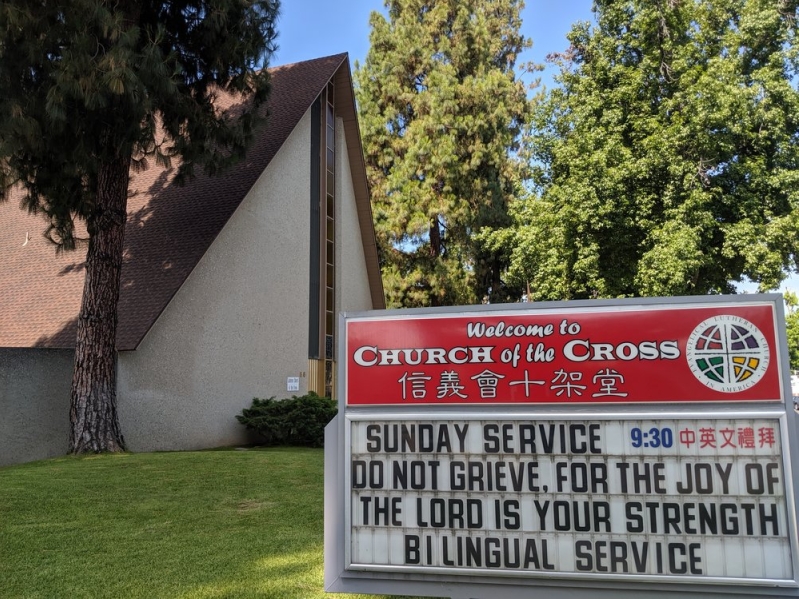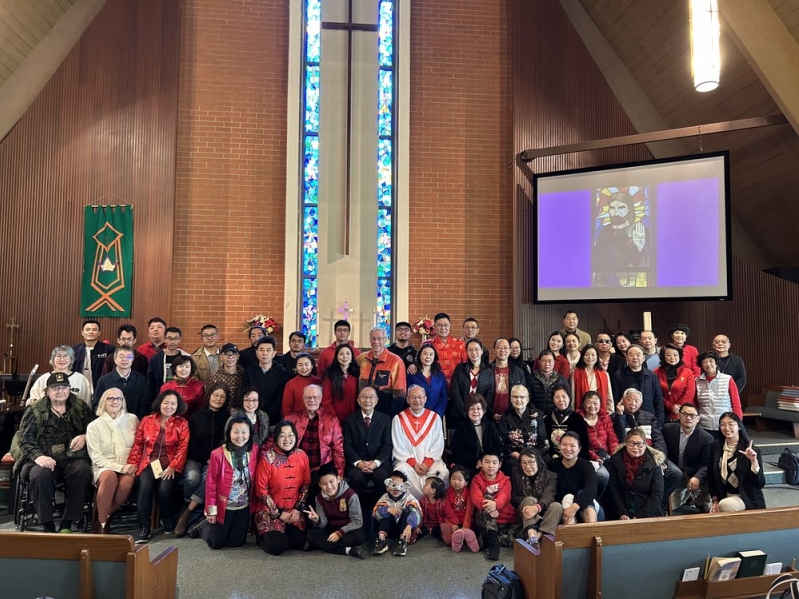
When Pastor Lu first walked into a small community church in Los Angeles with only ten members, he had to relearn how to schedule his pastoral duties. Having served for years in one of China’s renowned “megachurches,” he now faced a completely unfamiliar ministry environment.
In 2018, Pastor Lu came to the U.S. to study at Fuller Theological Seminary, majoring in intercultural studies and pursuing a Doctor of Ministry degree. Letting go of more than a decade of pastoral experience to return to student life was not easy for him. He missed the days of being busy in church ministry.
It didn’t take long before he started looking for ministry positions. Two years later, he moved out of student housing and into a Lutheran church in Arcadia. Beyond his studies, his pastoral journey resumed.
Two Starkly Different Ministry Experiences
Upon arrival, Pastor Lu found the church environment in the U.S. vastly different from what he had known in China.
At the megachurch, he was used to highly efficient operations and the zealous participation of church members. The pastors’ offices were always open, and believers would constantly stop by for counseling or fellowship. But in the American community church, even when he left his office door open all day, few came to visit—phone calls were rare, and his invitations to gatherings were met with little response.
Still, the small church had its own kind of warmth. Pastor Lu loves to cook. Whether living in a dorm or an apartment, he was always eager to treat friends to homemade meals. Known for his authentic Jiangsu-Zhejiang cuisine, he often rejoiced when he found good deals on ingredients, once saying, “If you can cook well, you’ll never be afraid to travel the world.” From Dongpo pork to braised chicken feet, he would occasionally prepare feasts for the whole congregation—something unimaginable in a megachurch. These days, whenever there’s a church potluck, his dishes are a highlight.
Shepherding Alone During the Pandemic
When COVID-19 broke out in 2020, Pastor Lu maintained the church’s online services by himself—playing piano, leading worship, preaching, recording videos—handling everything alone.
Sometimes, he would go to the empty church to record sermons. Viewership was low and engagement minimal. His persistence seemed to yield no fruit.
Even worse, when he tried recording worship videos at home, his neighbors repeatedly complained about the noise due to thin walls. The contrast between his expectations and reality, along with a deep sense of isolation, nearly overwhelmed him.
A Spiritual Turning Point
Those were especially lonely days. Pastor Lu recalled that although he kept preaching online, recording and uploading videos, there was hardly any response, and he felt deeply discouraged.
One day, at his lowest point, he knelt to pray while recording at church. In that moment, he experienced a powerful filling of the Holy Spirit. “God clearly showed me that every seat in this church would one day be filled,” he said, his eyes filling with tears.
That spiritual encounter renewed his strength. He realized that the motivation to serve does not come from visible results, but from a response to God’s calling.
Not Just Cultural Differences—But Spiritual Atmospheres
Throughout his ministry, Pastor Lu became increasingly aware of the differences in spiritual atmosphere between Chinese and American churches.
Chinese churches focus heavily on spiritual growth and sanctification. “In China, we often emphasize self-denial, taking up the cross, dying to self, and spiritual maturity,” he noted. In contrast, American sermons tend to highlight God’s love, faithfulness, and hope—undoubtedly important truths, but often neglecting His holiness, justice, and judgment of sin.
These differences are especially evident in pastoral practice. For example, Pastor Lu recalled that in Chinese churches, weddings were only held for believers who had kept themselves pure before marriage. Such standards are hard to uphold in the U.S., where mainstream culture clashes with biblical expectations. Over time, the foundations of the church have quietly eroded, making it harder to resist secularization.
Despite this, Pastor Lu remains committed to biblical teachings on holy living. When dealing with cohabiting couples, he clearly teaches that such behavior contradicts Scripture and temporarily bars them from taking communion.
He values spiritual maturity among believers. In China, though many believers may lack formal education, countless are devout, prayerful, eager to learn the Word, and generous in giving. “The 5 a.m. morning prayers in China” are part of many believers’ lives—his parents practiced it, and he has continued for decades. In the U.S., such spiritual discipline is much rarer.
A New Flock in a New Context: The Spiritual Challenges of Immigrant Believers
Pastor Lu is especially concerned about the spiritual well-being of Chinese immigrant believers. He has observed that some who were once passionate, prayerful, and actively serving in China grow spiritually cold after arriving in the U.S.—largely due to the pressures of immigration: legal status, employment, language barriers, and survival stress.
One striking example involved a brother from Northeast China who was a core church worker back home. After being referred to Pastor Lu’s church, he disappeared just two days after his first visit.
Pastor Lu believes the difference lies in stability. In China, many church volunteers had secure lives and structured routines. In the U.S., everything starts from scratch. The high cost of living can quickly wear down spiritual fervor.
He admits that he too faces the pressures of immigrant life. But his role as a pastor compels him to ask: how can spiritual leaders help the flock in such circumstances? He reflected on 1 Thessalonians 1:9: “You turned to God from idols to serve the living and true God.” “Our God is not just a religious concept,” he said, “but one we can draw near to, pray to, and experience daily.” He realized more deeply that the essence of pastoral ministry is to lead people into a real relationship with God.
At one point, overwhelmed by low church attendance, he lowered the bar for baptism. That year, he baptized ten people—most of whom never returned. Deeply grieved, he resolved to speak truth clearly from the beginning.
Now, baptism candidates must complete a seeker’s class, finish assignments, write book reports, and clearly articulate their faith and repentance journey.
“I don’t charge money, and I don’t do it for show. Only those truly born again can be baptized,” he said. “Discipleship must be disciplined and demanding. A pastor isn’t a babysitter but more like a spiritual parent—raising and training spiritual children into disciples.”
Full-Spectrum Ministry and a Path Toward Church Planting
Reflecting on his service in China, preaching was always at the core of Pastor Lu’s ministry. He was frequently invited to speak at various gatherings and shared messages with over a hundred churches. But when he began serving among Chinese communities in North America, he realized that congregants expected more than just solid biblical teaching—they also longed for practical care in everyday life.
In response to this cultural shift, Pastor Lu developed a unique pastoral approach. He wove his passion for cooking into ministry, preparing authentic Hangzhou dishes for church members. From Dongpo pork to spiced beef shank, from osmanthus cakes to sesame brittle—these tastes of home became a bridge of connection. At the same time, he expanded into digital evangelism, sharing gospel messages on platforms like YouTube.
“A qualified modern pastor should be equipped for land, sea, and air,” he said, describing his vision for holistic ministry: rooted in the local church (“land”), reaching global missions (“sea”), and developing online outreach (“air”). He is steadily closing the gap between this vision and reality.
This down-to-earth, multifaceted ministry approach has begun to bear fruit. Over the past year, Pastor Lu’s church has seen significant growth. The 2024 Christmas service drew 107 adults and 45 children—three times the attendance of the beginning of the year. This stands in stark contrast to the early days, when Sunday worship barely drew ten people, including staff.

Based on his research into church planting in North America, Pastor Lu has set a clear roadmap. Understanding the common “five years to lay the foundation, seven years to see results” pattern, he plans to focus in 2025 on training small group leaders, systematically equipping them in spiritual life, biblical truth, and practical service. By 2027, he hopes the church will be mature enough to launch a new church plant.
Though the church remains small, Pastor Lu holds fast to the vision God gave him: “Every seat in this church will one day be filled.”






